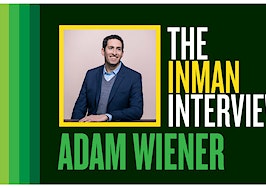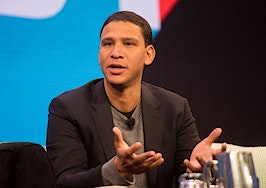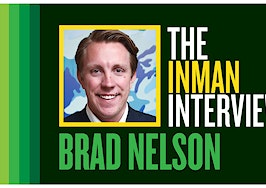 September is Marketing and Branding Month at Inman. That means we’re talking to the chief marketing officers at major brokerages about how the pandemic is changing their jobs and what it means for agents. We’re publishing a suite of tactical Inman Handbooks for marketing on digital portals. And we’re looking at what pages of the traditional marketing playbook still work. Join us all month long.
September is Marketing and Branding Month at Inman. That means we’re talking to the chief marketing officers at major brokerages about how the pandemic is changing their jobs and what it means for agents. We’re publishing a suite of tactical Inman Handbooks for marketing on digital portals. And we’re looking at what pages of the traditional marketing playbook still work. Join us all month long.
As one of the longest-tenured employees at Compass, Matt Spangler has worn many hats. He’s served as chief creative officer, chief brand and communications officer and now chief marketing solutions officer.
But consistently throughout the six years that he’s been with the company, Spangler, who prior to joining Compass was the executive vice president of content and marketing at Tribeca Enterprises, has been tasked with growing Compass’ brand presence, which has included a name change and numerous product rollouts.
Spangler recently spoke with Inman about his role at the ever-growing company, as well as the expectations that come with leading marketing for a tech unicorn often in the public eye.
You are one of Compass’ longest-tenured employees, so you’ve seen the company grow from very small to very big, very quickly. Can you walk me through building Compass’ brand, from a startup that doesn’t have an established identity to being one of the biggest brokerages in the industry?
When I first thought about going to Compass, it was really one of the incredible opportunities, being able to see a space that I was incredibly interested in. You’re looking at the cultural connection that home has to the world and people and you’re even seeing that more so than ever today with what we’ve been going through. There was an opportunity to create a brand that really had that connection, one that I truly loved, and I thought that I could bring my own personal expertise into that.
The exciting thing has been, even from that beginning of transitioning from Urban Compass to Compass, all of the decisions and all of the things we’ve done have been in partnership with the agents or in service of the customers.
I always felt like that was this people-centric shift where we were really empowering entrepreneurs and business owners with technology and building a platform so that they can grow their business, and have a brand that they can be a part of and help build, was and still is today, the thing that gets me really excited about this role. It’s still today, one of the things that really powers the success and growth of Compass as a brand.
Real estate is built on getting consumers to trust your brand with the biggest purchase of their life. The industry, for so long, has been dominated by top names and legacy brands. How, as a new name, do you build that trust to compete with brands that have been around for decades?
I think at the end of the day, by building it in partnership with the best agents in the industry, and going out and recruiting, and listening to them, and building it based on their feedback, they’re really the ones that are taking the brand out and building trust with the clients. So much of the experience you have with real estate is working through an agent and building that trust with them.
Everything we’ve done from building the marketing center tools so agents can build their own brands and make beautiful materials that have integrated communications that matter to the clients, that’s really the stuff that’s helped us establish the Compass brand in a world, like you said, where there are a lot of legacy companies. That’s a major part of it.
Here’s an example: So much of today’s marketing, which is important, is delivering messages that matter to their clients in their voice. I was talking to a New York agent last week. I did a masterclass on how we leverage the Compass CRM to deliver messaging that matters to their clients.
This New York agent watched the class, went to the CRM, tagged a certain set of his clients with fitness in this case because he knew they cared about fitness from interactions he had with them and they knew he was someone who cared about that. So when the New York gyms reopened, he sent, in 10 minutes, a custom message to that list.
That tag automated that list of people. Marketing center has great content about fitness and gyms re-opening and in 10 minutes he sent a message that got a 50 percent open rate and 25 percent of the people reached out to him because it was something they cared about.
So it’s this shift of building trust with the clients and doing it in a customized, beautiful way that matters to them. That is what builds brand trust. It’s no different if you’re an agent who’s doing it or Compass the brand.
Something that Compass CEO Robert Reffkin has said often is that Compass’ customers are its agents. But at the same time you’re marketing to consumers through agents, so how do you take that two-pronged approach to advertising yourself to both potential agents and consumers?
We’re not doing a lot of direct marketing to consumers because we’re empowering almost 20,000 agents to go and do that communication in the right way, in a customizable way like I just described, to those clients. So by building those products and tools that allow our agents to be more effective and better marketers, they then are the ones that are doing a fantastic job and promoting the brand and building the trust between the brand and the end consumer.
Now, of course you have to have a wonderful consumer experience like we’ve built when you want to do search and communicate with the client, like we do with collections, etc., but that really is the best marketing that we’ve focused on, to build the consumer marketing experience.
Even more so as I’ve shifted my team into the product organization and focused even more on the technology, the platform investments we’ve made are now really being leveraged this year.
How integrated are the marketing and product teams at Compass?
We are now completely partnered inside the product and engineering organization. My team is focusing on creating actual marketing products with those teams that make our customers better marketers. We have focused on looking at the core things that our agents do, that have an impact on their marketing.
Things like, making videos for their listings, we co-developed the video generator tool for that. We’ve been working on the Compass digital ads tools in partnership with them. We’re launching all kinds of new capabilities for them to include video ads and customized ads with their particular sphere, which is a tool launching next month. We’ve built a gift center integration because gifting is an incredible part of relationship marketing for our customers. We’re sitting inside the teams building these tools and partnerships, and then leveraging them to make our customers better marketers.
How do you manage the expectations of such public-facing work for a company that’s raised more than $1 billion and is considered a tech unicorn? It seems like you can’t do things quietly at a company like Compass.
We embrace it. At the end of the day, we’re super focused on the customers. We have to be. There’s so much noise out there that we could get distracted by, but as long as we continue to focus, everyone in the organization is like, “How can we support them, build tools to help them run their business, and do it in a seamless, easy and integrated way?” That is what everyone in the business and everyone on my team in marketing at Compass is incredibly focused on.
There’s always going to be that noise. It’s only going to get louder, as we get closer to going public or whatever might happen in the future. We talk about that a lot. We think about our product tenets. “Agents as our customers” is one tenet, just making products that make them better. Our teams can look at the tenets consistently, and they really help guide us and allow us to not get distracted.
Has pandemic changed the way the company tries to engage customers? Has the company been forced to find a different tone or approach?
I think we’ve always emphasized delivering value for people. I think, more so than ever, that is important today. People are thinking so much about what’s really important to them. So we’re encouraging our agents and offering them things like content and tools to help them be more customized and really deliver that value for people.
We think about that across the brand as well: Are we providing the best possible value for our agents and customers? Are we giving them things that they can in turn deliver that value to their clients, or can market those listings more effectively and more easily, or give them the reporting so that they can show their clients the work they’re doing on their behalf?
We’ve been doing that. If anything, it’s only emphasized more now through the pandemic and the impact its had on all of our lives.
Do you think the industry still has misconceptions about what the Compass brand represents? How have you tried to change minds as you’re recruiting agents and trying to get agents from other companies? Maybe some of those companies are saying one thing about Compass and you’ve got to paint a different picture than what your competitors are saying?
I wish they could talk to our customers directly. I wish they could talk to our 18,000 agents. I wish they could talk to them because what they’d hear is the company having an impact on their lives in a positive way and in their business. We’ve seen an 80 percent increase on the platform since March. Agents have come to us and told us time and time again how this is helping them get through this incredible hard time.
There’s always going to be rumors, there’s always going to be competitors that are going to say negative things, but we’re very focused on making their lives better. And by doing that, their clients are going to have a better experience. They’ll be able to spend more time with them.
Agents are going to be able to understand, in the CRM, this person in your contact database is likely to sell. We’ve got a fantastic tool, “the likely to sell recommendation,” that’s the best possible marketing. You’re going to a client that actually has a potential interest in something and not just reaching out to them blankly and saying, “I’m just saying hi.” You’re telling them, because of all these parameters we built into the tool, “You might actually be interested in this.”
If people really saw the value and looked at that story instead of a lot of the other stuff that gets thrown around, that’s the story I’d love to get told more.














